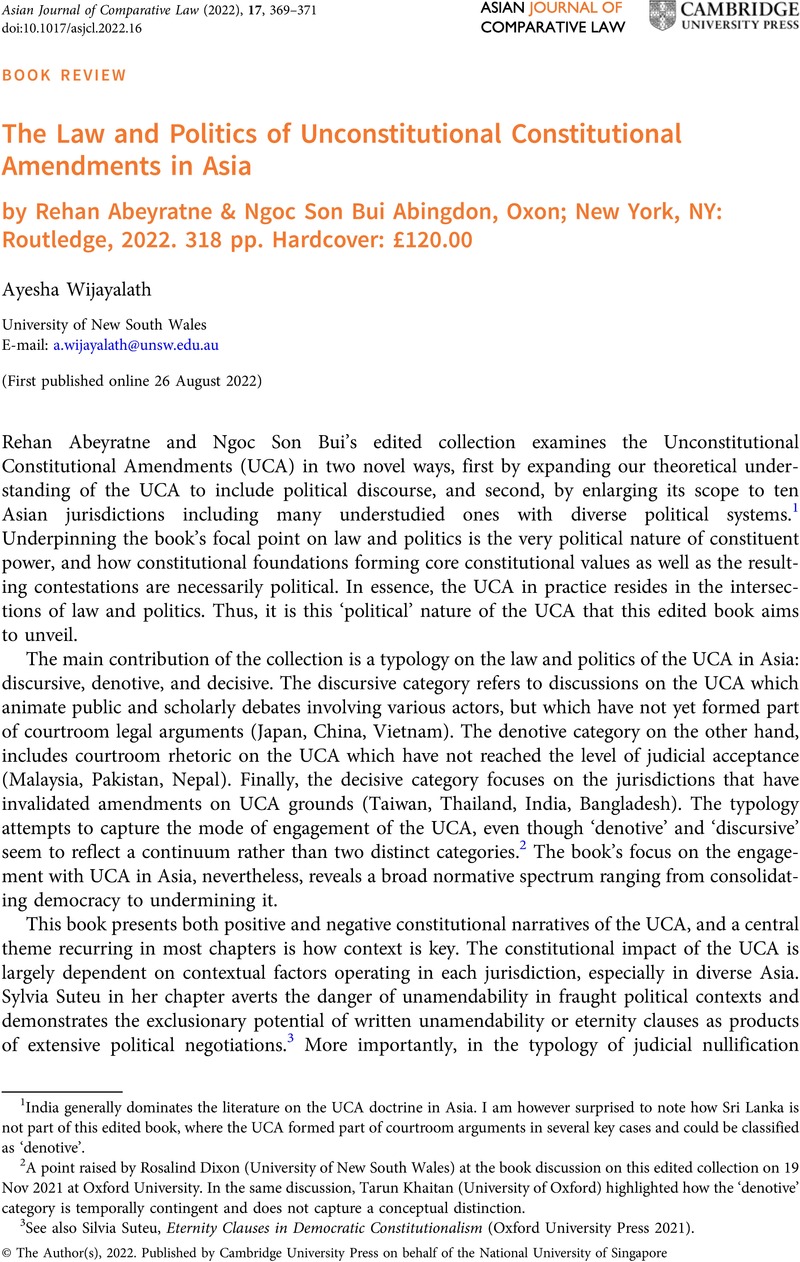No CrossRef data available.
Article contents
The Law and Politics of Unconstitutional Constitutional Amendments in Asia by Rehan Abeyratne & Ngoc Son Bui Abingdon, Oxon; New York, NY: Routledge, 2022. 318 pp. Hardcover: £120.00
Review products
Published online by Cambridge University Press: 26 August 2022
Abstract

- Type
- Book Review
- Information
- Copyright
- Copyright © The Author(s), 2022. Published by Cambridge University Press on behalf of the National University of Singapore
References
1 India generally dominates the literature on the UCA doctrine in Asia. I am however surprised to note how Sri Lanka is not part of this edited book, where the UCA formed part of courtroom arguments in several key cases and could be classified as ‘denotive’.
2 A point raised by Rosalind Dixon (University of New South Wales) at the book discussion on this edited collection on 19 Nov 2021 at Oxford University. In the same discussion, Tarun Khaitan (University of Oxford) highlighted how the ‘denotive’ category is temporally contingent and does not capture a conceptual distinction.
3 See also Suteu, Silvia, Eternity Clauses in Democratic Constitutionalism (Oxford University Press 2021)CrossRefGoogle Scholar.
4 Neo, Jaclyn L, ‘A Contextual Approach to Unconstitutional Constitutional Amendments: Judicial Power and the Basic Structure Doctrine in Malaysia’ (2020) 15 Asian Journal of Comparative Law 69CrossRefGoogle Scholar.
5 Andreas Kalyvas distinguishes between sovereignty and constituent power and establishes the latter as a power establishing the constitutional order: see Kalyvas, Andreas, ‘Popular Sovereignty, Democracy, and the Constituent Power’ (2005) 12 Constellations 223CrossRefGoogle Scholar. Joel Colon-Rios argues that the power of a Constituent Assembly is limited to creating a constitution, and is not empowered to exercise full sovereign powers including its legislative, executive, and judicial powers: see Colón-Ríos, Joel, Constituent Power and the Law (Oxford University Press 2020)CrossRefGoogle Scholar.
6 Landau, David E, Dixon, Rosalind & Roznai, Yaniv, ‘From an Unconstitutional Constitutional Amendment to an Unconstitutional Constitution? Lessons from Honduras’ (2019) 8 Global Constitutionalism 40CrossRefGoogle Scholar.
7 See Loughlin, Martin & Walker, Neil, The Paradox of Constitutionalism: Constituent Power and Constitutional Form (Oxford University Press 2008)CrossRefGoogle Scholar.


